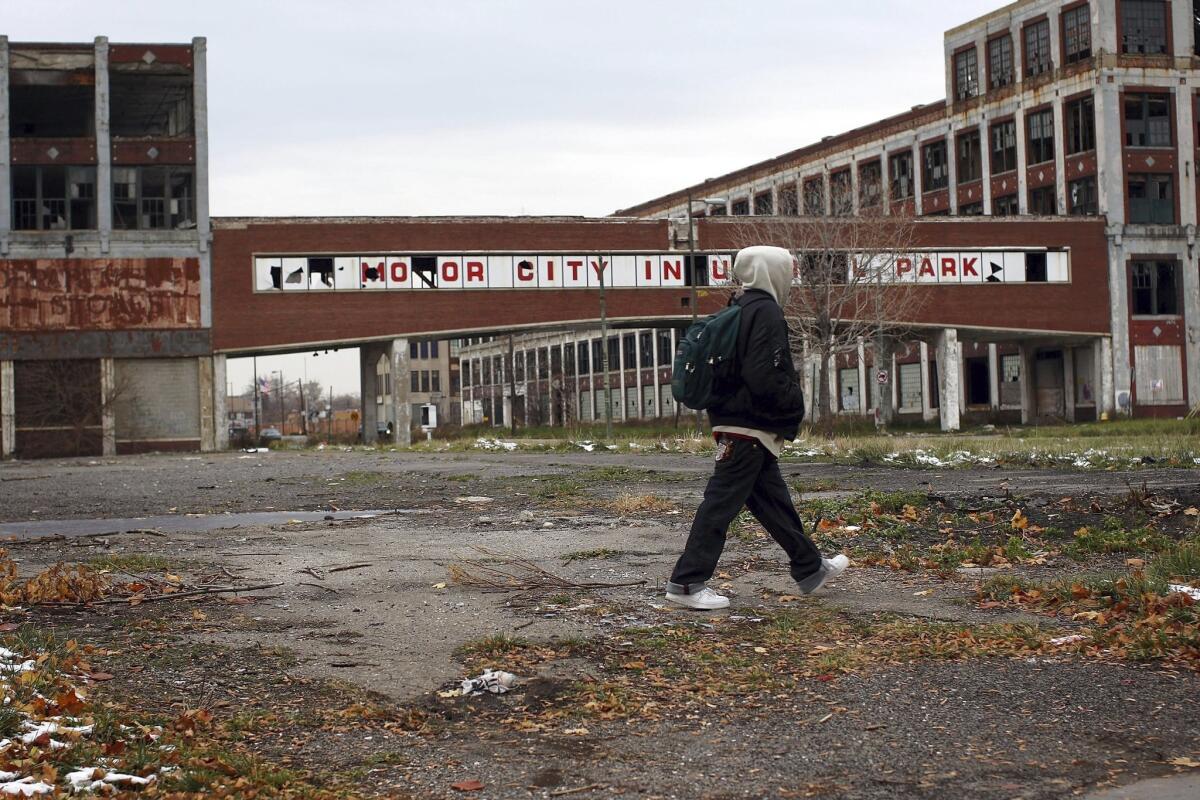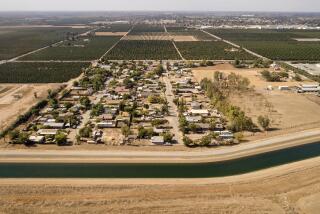Opinion: Cutting off water to Detroiters another wrong turn for Motor City

- Share via
A few years ago Chrysler made a splash with an Eminem-narrated ad for one of its cars billed as “imported from Detroit,” a clever play on the market-share battles between the domestic automakers and the Toyotas, Hondas and Mercedeses of the world. But the campaign also reinforced a sense of Detroit as a place not quite of this country.
This week, it feels even less so.
The city’s water department has been shutting off the tap to thousands of Detroiters over unpaid water bills. Big deal, you think. Pay the bill, get the water turned back on. But that’s not so easy in a place of such broad, deep and unrelenting poverty. Activists this week petitioned the United Nations for help, and an official there obliged, opining that, “when there is genuine inability to pay, human rights simply forbids disconnections.” A nonbinding opinion, but it did spotlight the problem, which was the activists’ point all along.
But there’s more than good agit-prop going on here. Denying people access to one of the givens of modern society — reliably potable water — should not happen in a country that, despite seven years of economic troubles, remains one of the richest in the world. Granted, there likely are water users in Detroit who can afford to pay but have been skating. But there are uncounted others who don’t have the means to pay. Is the solution to shut them off, and create potential public health catastrophes in the process?
Compounding the issue is the city’s bankruptcy. Kevyn Orr, the emergency manager appointed by Gov. Rick Snyder, has been looking at either selling the city’s water department — which supplies Detroit and 127 surrounding communities, about 40% of the state’s population — or working out a lease arrangement, which one presumes would mean layoffs and other cutbacks. But all those unpaid bills on the books complicates the city’s bargaining position.
The problem boils down to the same issues that sent Detroit into bankruptcy last summer: a collapsed urban economy and community. As I’ve written before, decades of corporate and government policies (recent corruption scandals haven’t helped) have brought Detroit to this juncture. The city’s population has dropped by more than 1 million — in excess of 60% — since 1950, and as the New York Times reports, more than 26,000 houses in the city face tax-delinquency foreclosures. A Detroit anti-blight project this spring counted 40,000 mostly abandoned properties it described as “candidates for removal,” nearly half of the 80,000-plus buildings and vacant lots it catalogued as causing blight. It is that exodus and collapsed tax base that fed the city’s budget problems, and all this cutting and privatizing might balance the city budget, but it will do nothing to help the city as a community.
The problems are staggering. The official unemployment rate of around 15% for the city is almost irrelevant given how many Detroiters have quit looking for work. Nearly 4 in 10 city residents live below the federal poverty line, as do more than 5 in 10 children. And two-thirds of the city’s children live in homes receiving some form of public assistance.
There are no easy answers to that kind of poverty. But shutting off a basic necessity like water only exacerbates the problems. People should pay their bills, of course, but in a climate of such abject poverty, our notions of what is fair and right should shift from dollars and cents to life and health. A city of deep poverty in which people lose access to clean water is a recipe for a public health problem of a Third World magnitude.
The city, regional and the state governments have proved they aren’t up to the task, and the Obama administration has been sympathetic, and offered some cash, but has also said it will not bail out the city, even though it did bail out the auto industry, to great success.
This is the toughest part to swallow: Businesses get the eye and the checkbook of the federal government. Poor people, and dying communities, not so much. Maybe if Detroiters enticed their cross-river neighbors in Windsor, Canada, to invade, the city could import some directed humanitarian assistance from Washington.
Follow Scott Martelle on Twitter @smartelle
More to Read
A cure for the common opinion
Get thought-provoking perspectives with our weekly newsletter.
You may occasionally receive promotional content from the Los Angeles Times.










